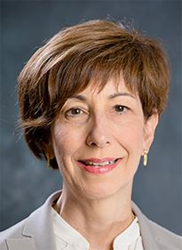Igniting Innovation Through Global Collaboration: DIA 2022

By Ed Miseta, Chief Editor, Clinical Leader

DIA's Global Annual Meeting is the largest gathering of regulators, industry experts, healthcare practitioners, life science researchers, and patients. This June, DIA will bring this community to Chicago for an in-person meeting which promises to be a celebration and reunion. Participation from all sectors will be significant, with thousands of attendees and strong representation by regulators from around the globe.
“What makes DIA unique is the fact that we welcome all members of the life science community to address the most pressing issues in health, those that have multistakeholder impact,” says Barbara Lopez Kunz, global chief executive for DIA. “This includes individuals from around the globe, from those involved with early ideation through to patients receiving the treatments. They unite at the same table to share their perspectives and to ensure the outcomes we pursue are the right ones for patients. This meeting will also be a celebration of what the industry accomplished over the last two years, but, most importantly, what we learned and how we can apply that learning to future challenges.”

The Regulator Perspective
In the life science industry, regulators play a huge role. DIA has always invited the voice of the regulatory community, and this year will be no different. Kunz states that DIA has already received numerous registrations, and secured several speakers, from health authorities from around the globe.
“A large number of representatives from the regulatory authorities will be present at DIA 2022,” she says. “We are going to continue to have the regulatory town hall sessions, which at past meetings have been some of the best attended discussions. Even with COVID continuing to have a significant impact in China, we are expecting to have the NMPA (National Medical Products Administration) present, either in person or virtually.” Both EMA and PMDA are also sending their top officials to Chicago, along with other members of the organizations.
The EMA is expected to take part in person in the opening keynote discussion about globalization and regulatory approval, which will cover how the industry can achieve better communication around drug approvals. Kunz also expects the FDA to discuss patient diversity, its guidance on the topic, and what it expects from the industry. “On the topic of sustaining COVID innovations, we're expecting the FDA town hall session to discuss accelerated approvals, an issue they have been focused on,” Kunz says. Additionally, expect to hear about other key priorities for the centers in the months and years ahead, including advance manufacturing, dose optimization, and global efforts to harmonize on applications and post-market CMC requirements.
Data Data Data
The second topic that attendees can expect to hear about in many sessions is data. The applications of real-world data (RWD) and real-world evidence (RWE) continue to expand, along with the use of electronic health records, in clinical research. Data integration, as well as the decentralization of clinical trials, is a concern for clinical executives and regulators. The hope is that new sources of data will reduce the time and expense related to running clinical trials.
Health equity and patient diversity in product development will take center stage at this year’s meeting. The past several years have reinforced long-standing concerns that trials have not been designed to include sufficiently diverse and representative populations, including diversity in age, gender, and racial and ethnic backgrounds. Both the FDA and Congress are now acting to make sponsor companies more accountable for their patient diversity efforts. There is an opportunity to leverage RWD and RWE to ensure appropriate representation in trials, a topic which will be discussed in a DIAmond session.
Sustaining Pandemic Innovation in Future Clinical Development
A lot has changed since DIA held its last in-person meeting in 2019, most of all the new efficiencies that have been realized through expanded integration of digital and remote approaches, global collaboration, and the engagement of the right patients at the right time. Kunz notes that the accelerated acceptance and application of these innovations was forced upon the industry by the pandemic and will be a topic of discussion at the 2022 event. More specifically, how the industry can sustain those that have emerged as best practices such as the use of connected devices, leveraging real-world data in novel trial designs, remote monitoring, decentralization of clinical trials, AI/ML for assuring diversity, and many others will be discussed.
“The emergency situation resulting from COVID forced all parts of the clinical ecosystem to make changes that had been talked about for years,” states Kunz. “The industry had to quickly figure out how to conduct clinical trials in a disrupted environment. We have seen an unprecedented rate of adoption of innovation over the last two years. Now we must sustain it across the entire spectrum.”
When the industry incorporates more flexibility into trials, Kunz states, the results will be good for patients. During the pandemic, COVID patients got what they needed: access to effective vaccines and treatments. Kunz hopes that same kind of innovation will be applied to other disease areas, and that DIA 2022 will serve as a catalytic force for those improvements.
Another topic Kunz expects to be discussed is the crisis in Ukraine and how it is impacting clinical development and patients.
“A large number of clinical trials have been disrupted because of the war,” she states. “Research participants have not been able to get to hospitals, and in many cases, medicines and supplies are challenging to deliver. Many have not been able to continue participation in trials due to the destruction and disruptions in Ukraine. What’s being experienced in the Ukraine is yet another challenge for patients amidst the pandemic. For many of them, the healthcare system they depended on suddenly fell apart.”
DIA attendees will hear insights on how to deal with product development and patient participation in trials during crises.
Collaboration and Cooperation
The final topic that will be discussed extensively is the theme of this year’s annual meeting, which is innovation through collaboration. “DIA’s commitment to maintaining a neutral platform is paramount to the open and trusting discussions and debates at DIA that lead to the transformations we have supported over many years,” Kunz says. “Our community comes together to share the learning so that all participants are operating with state-of-the-art thinking. This collaboration fires the innovation machine that enables new therapies and cures, as well as novel tools and processes, that ultimately benefit patients.”
Lessons Learned
The Global Annual Meeting was virtual in 2020 and 2021. Lessons were learned from the preparation for those events, which Kunz notes has the organization evolving to what she has termed DIA 2.0.
“We have learned an enormous amount about what our members and our stakeholders want and need and how we continue to serve as a valuable resource for them,” notes Kunz. “At the same time, our community is redefining how it wants to operate. It wasn't that long ago that people felt doing everything virtual was acceptable and that being together in person was not needed to advance the science and policy needs in health. Regulators and leaders from across the broad ecosystem are realizing that the optimal outcomes emerge with selective use of multiple ways of convening, including in-person and digital engagements.”
Converting a meeting from one format to another, for example from in person to digital, entailed a lot of work, and DIA members responded very positively, but Kunz is ready for a return to more in-person events. She learned many lessons from the last two years. First, she believes that online networking cannot be done effectively. DIA tried many different methods to socially engineer digital interactions. She notes that none were the same as the ability to meet people in person and spend time together with them at sessions, meetings, lunches, and receptions.
“In-person networking is important,” she states. “People like to experience the exhibitions on the show floor and the innovation theaters. Even though we acquired the best virtual platforms available at the time, the networking and the sparks of innovation that emerge from it just weren’t the same. You can’t fully virtually replicate the networking, debate, and discussions that take place at a live event.”
Facilitate Networking
To facilitate networking and discussion, the live event will feature more innovation theaters, more round table discussions, and a packed exhibition hall. Kunz notes that she is incredibly energized by the willingness of the healthcare community to return to the live event.
“Our sponsors want to get their brands noticed,” says Kunz. “Attendees will see a lot more activity, social engagement, and interactive topics. There will also be a few surprises here and there. From beginning to end, we want this to feel like a celebration and a reunion. We will celebrate our successes of the past but focus on the future. The future of healthcare is digital, global, inclusive, and patient-centric. How do we make patient centricity our everyday reality? How do we reduce the cost and increase the accessibility of therapeutic products? We are going to share different perspectives from experts in those fields and unite these into our themes.”
The DIA 2022 Global Annual Meeting will take place in Chicago from June 19 to 23. For more information, click here.
If you plan to attend the DIA Global Annual Meeting, be aware that the organization is planning to follow safe meeting practices and will be strict about requiring vaccination. The event will also require masking.
